Whether you’re aiming for a classic, contemporary, or rustic look, this guide will walk you through everything you need to know about selecting the perfect floor tiles for your dream kitchen.
Are you dreaming of a kitchen that exudes elegance, functionality, and style? Look no further than the floor tiles that will set the foundation for your dream space. Choosing the perfect floor tiles for your kitchen is a crucial decision that requires careful consideration. Not only do they need to withstand daily wear and tear, but they should also complement your kitchen’s overall aesthetic. With an overwhelming array of options available, it can be challenging to find the right balance between durability and design.
But fear not! As a highly skilled assistant specializing in digital marketing, copywriting, and content writing, I am here to guide you through the process. In this article, I will share expert tips and tricks to help you select the perfect floor tiles for your dream kitchen, ensuring a space that is not only visually stunning but also functional and long-lasting. So let’s dive in and discover the possibilities that await you in creating a kitchen that truly reflects your personal style and culinary aspirations.
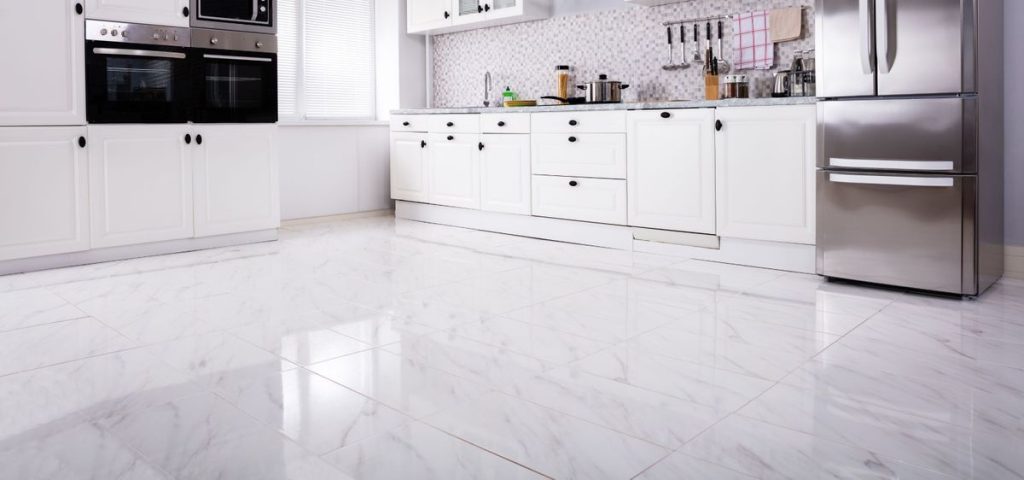
Importance of Choosing the Right Floor Tiles for Kitchen
When it comes to kitchen design, floor tiles play a vital role in tying the whole space together. Not only do they provide a durable surface for everyday use, but they also set the tone for the overall look and feel of your kitchen. The right floor tiles can enhance the beauty of your cabinetry, countertops, and backsplash, creating a cohesive and harmonious design.
On the other hand, choosing the wrong tiles can lead to a visual disconnect and diminish the overall appeal of your kitchen. Therefore, it is essential to carefully consider various factors before making a decision.
Factors to Consider When Selecting Kitchen Floor Tiles
Before diving into the world of kitchen floor tiles, it’s important to have a clear understanding of the factors that should influence your decision. By considering these factors, you can ensure that your chosen tiles not only meet your aesthetic preferences but also fulfil your practical needs.
Durability: Kitchen floors are subjected to heavy foot traffic, spills, and dropped utensils, so durability is of utmost importance. Look for tiles that are resistant to scratches, stains, and moisture. Porcelain and ceramic tiles are excellent choices due to their durability and low maintenance requirements.
Slip Resistance: Kitchens can be prone to spills, which can create a slippery surface. Opt for tiles with a slip-resistant rating, especially if you have young children or elderly family members. Textured or matte-finish tiles are good options as they provide better traction.
Style and Aesthetic: Your kitchen floor tiles should complement the overall style and aesthetic of your kitchen. Consider the colour palette, theme, and design elements of your space. Whether you prefer a classic, modern, or rustic look, there are tiles available to suit every style.
Size and Layout: The size and layout of your kitchen will also influence your tile selection. Larger tiles can create an illusion of a more spacious kitchen, while smaller tiles can add visual interest and texture. Consider the scale and proportions of your kitchen when choosing the size of your tiles.
Maintenance: Different types of tiles require varying levels of maintenance. Some tiles may need sealing, while others may require regular cleaning with specific products. Consider your lifestyle and the amount of time you can dedicate to tile maintenance before making a decision.
Budget: Set a budget for your kitchen floor tile project and stick to it. With a wide range of options available, you can find tiles that suit your budget without compromising on quality or style. Keep in mind that investing in high-quality tiles will ensure long-term durability and satisfaction.
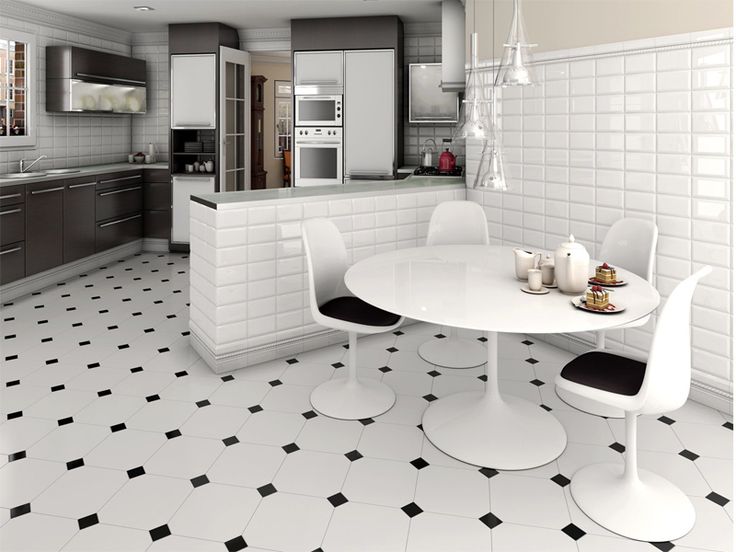
Popular Types of Floor Tiles for Kitchen
Now that you have a clear understanding of the factors to consider, let’s explore some of the popular types of floor tiles that are commonly used in kitchens.
Porcelain Tiles: Porcelain tiles are a top choice for kitchen floors due to their exceptional durability and versatility. They are available in a wide range of colours, patterns, and finishes, making it easy to find the perfect fit for your kitchen. Porcelain tiles are resistant to stains, scratches, and moisture, making them ideal for high-traffic areas.
Ceramic Tiles: Ceramic tiles are another popular option for kitchen floors. They are less expensive than porcelain tiles but offer similar benefits in terms of durability and versatility. Ceramic tiles come in various designs and can mimic the look of natural stone or wood, adding a touch of elegance to your kitchen.
Natural Stone Tiles: If you’re looking to add a touch of luxury to your kitchen, natural stone tiles are an excellent choice. Options such as marble, granite, and travertine offer unique patterns and textures that can elevate the overall aesthetic of your kitchen. However, it’s important to note that natural stone tiles require regular sealing and maintenance to preserve their beauty.
Vinyl Tiles: Vinyl tiles are a budget-friendly option that offers durability and easy maintenance. They come in a wide range of colours and patterns, including designs that mimic the look of natural materials like stone or wood. Vinyl tiles are comfortable to walk on, resistant to moisture, and easy to clean, making them a popular choice for busy kitchens.
Cork Tiles: Cork tiles are a sustainable and eco-friendly choice for kitchen floors. They provide a soft and comfortable surface to walk on and have natural acoustic and thermal insulation properties. Cork tiles are resistant to moisture and allergens, making them an excellent choice for those with respiratory issues or allergies.

Pros and Cons of Different Kitchen Floor Tile Materials
Each type of kitchen floor tile material comes with its own set of advantages and disadvantages. It’s essential to weigh these pros and cons to make an informed decision based on your specific needs and preferences.
Porcelain Tiles:
Pros:
– Exceptional durability and resistance to stains, scratches, and moisture.
– Wide range of colours, patterns, and finishes to choose from.
– Low maintenance requirements.
– Suitable for high-traffic areas.
Cons:
– Higher cost compared to other tile materials.
– Can be heavier and more difficult to install.
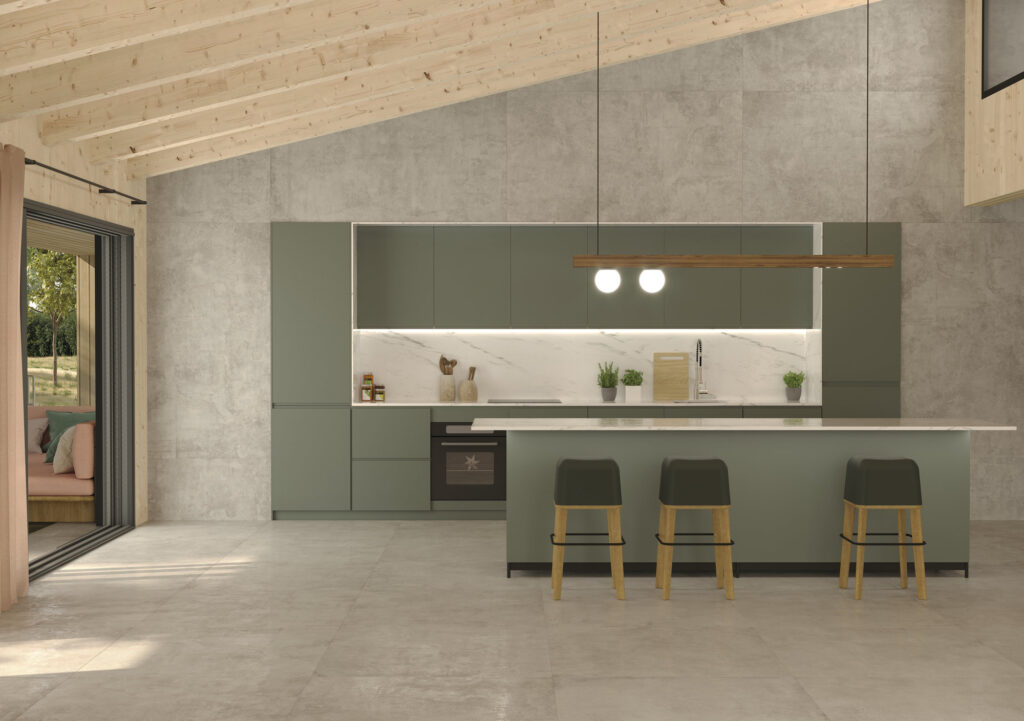
Ceramic Tiles:
Pros:
– Cost-effective option without compromising on durability.
– Versatile and available in various designs.
– Easy to clean and maintain.
– Can mimic the look of natural stone or wood.
Cons:
– Not as durable as porcelain tiles.
– May require regular sealing to prevent staining.
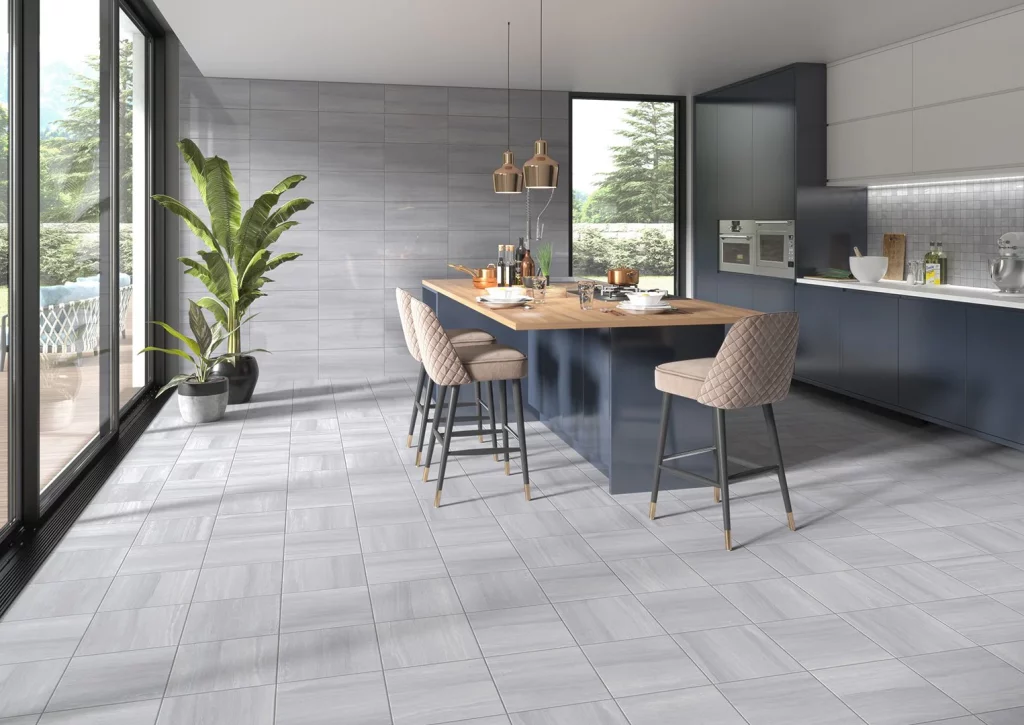
Natural Stone Tiles:
Pros:
– Unique patterns and textures for a luxurious look.
– Durable and long-lasting.
– Adds value to your home.
– Can be polished or honed for a customized finish.
Cons:
– Requires regular sealing and maintenance.
– Higher cost compared to other tile materials.
– Can be more susceptible to stains and scratches.
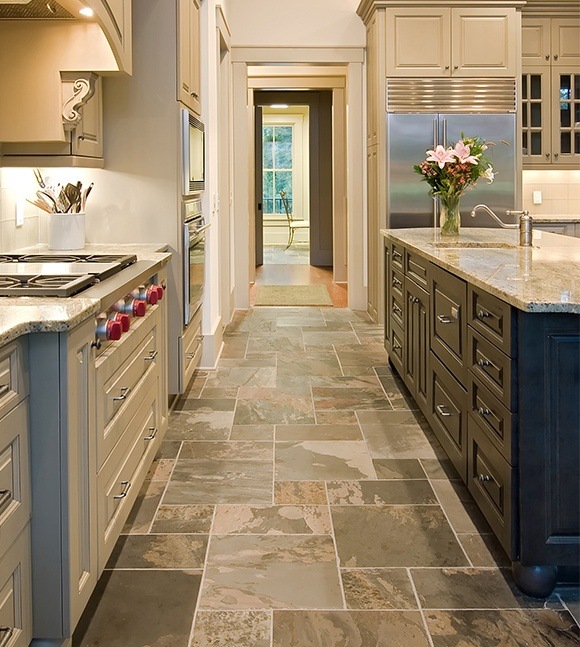
Vinyl Tiles:
Pros:
– Affordable and budget-friendly option.
– Wide range of colours and patterns available.
– Comfortable to walk on and easy to clean.
– Resistant to moisture and stains.
Cons:
– Not as durable as porcelain or natural stone tiles.
– May require replacement over time.
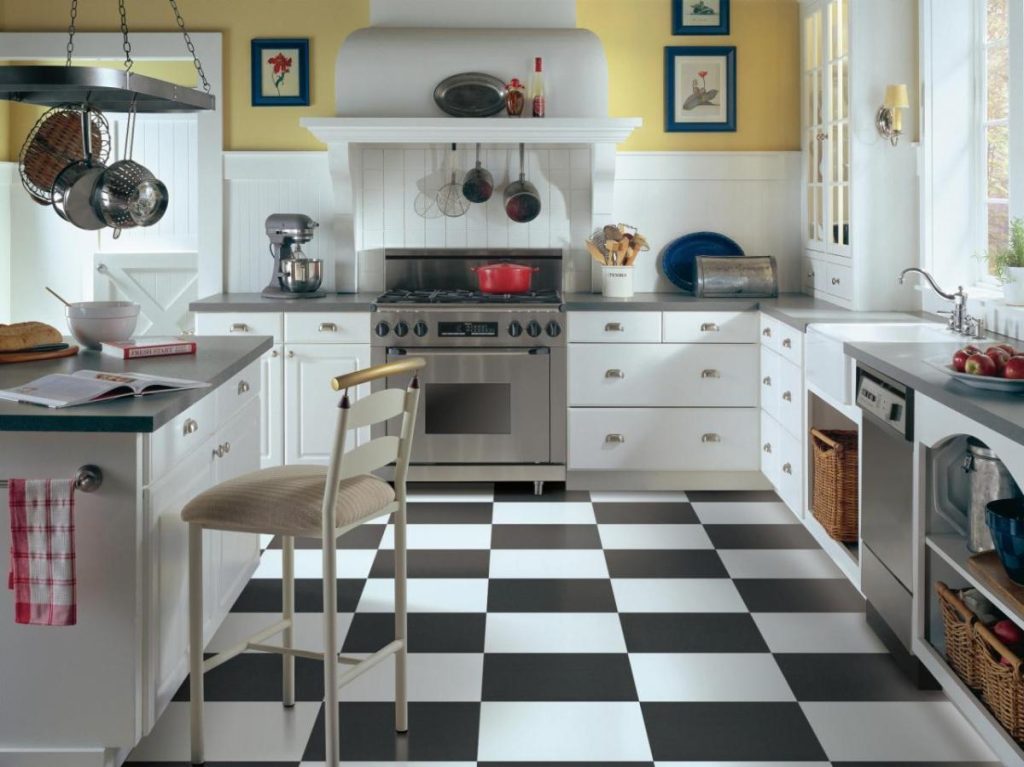
Cork Tiles:
Pros:
– Sustainable and eco-friendly choice.
– Soft and comfortable surface to walk on.
– Natural acoustic and thermal insulation properties.
– Resistant to moisture and allergens.
Cons:
– Can be susceptible to scratches and dents.
– Requires regular sealing to prevent damage.
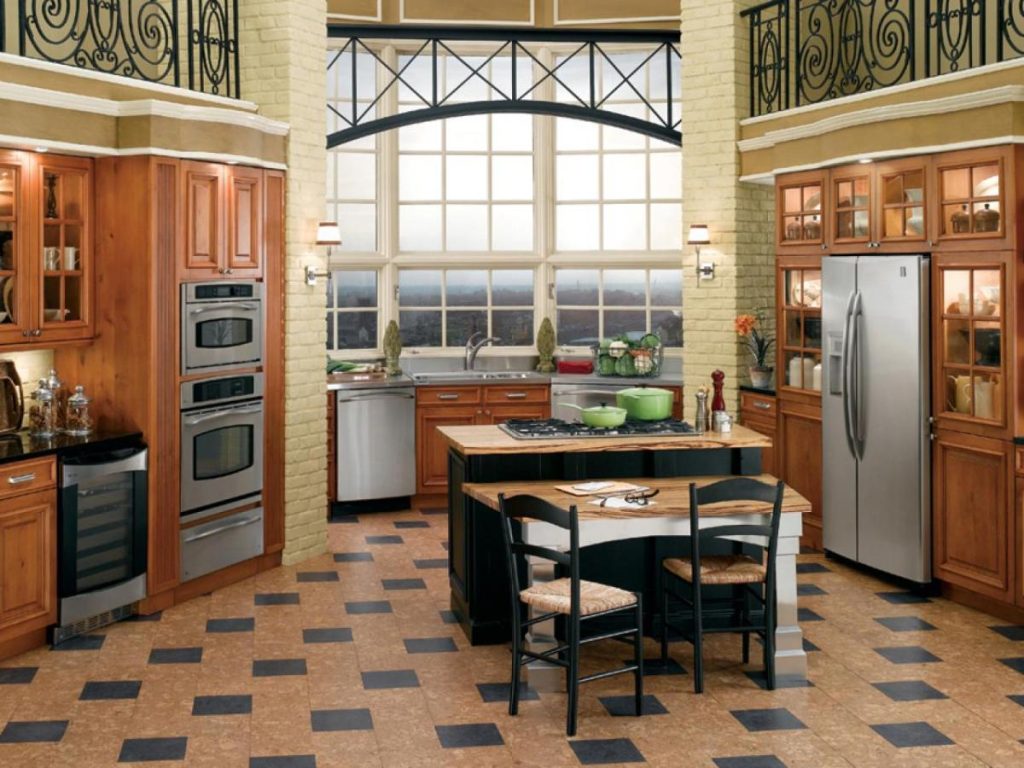
Choosing the Right Color and Pattern for Your Kitchen Floor Tiles
The colour and pattern of your kitchen floor tiles can significantly impact the overall look and feel of your space. Here are some tips to help you choose the right colour and pattern for your kitchen floor tiles.
Light and Neutral Colors: Light and neutral-coloured tiles can create a sense of spaciousness and brightness in your kitchen. They also provide a versatile backdrop for various design elements and allow you to easily change the overall look of your kitchen in the future.
Dark Colors: Dark-colored tiles can add depth and richness to your kitchen, creating a more dramatic and sophisticated look. However, keep in mind that dark tiles can show dirt and scratches more easily, so proper maintenance is essential.
Patterned Tiles: Patterned tiles can add visual interest and personality to your kitchen. Consider using patterned tiles as an accent or focal point in your space, such as in a backsplash or as a border around the perimeter of the kitchen.
Size and Layout: The size and layout of your kitchen can also influence your choice of colour and pattern. For small kitchens, light-coloured and larger tiles can create the illusion of a more spacious area. In larger kitchens, you have more flexibility to experiment with different colours and patterns.
Tips for Maintaining and Cleaning Kitchen Floor Tiles
To ensure that your kitchen floor tiles stay in pristine condition for years to come, it’s important to follow proper maintenance and cleaning practices. Here are some tips to help you keep your tiles looking their best.
Regular Sweeping or Vacuuming: Sweep or vacuum your kitchen floor regularly to remove dirt, dust, and debris. This will prevent scratches and maintain the appearance of your tiles.
Prompt Spill Cleanup: Clean up spills immediately to prevent stains and potential damage to your tiles. Use a damp cloth or mop to wipe away any spills, and avoid using abrasive cleaners that can scratch the tiles.
Avoid Harsh Chemicals: When cleaning your kitchen floor tiles, avoid using harsh chemicals that can damage the surface or strip away the protective sealant. Stick to mild, pH-neutral cleaners recommended by the tile manufacturer.
Regular Sealing: If you have natural stone tiles, it’s important to regularly seal them to protect against stains and moisture. Follow the manufacturer’s recommendations for sealing frequency.
Avoid Scratching: Place felt pads or protective mats under heavy furniture or appliances to prevent scratching or damage to your tiles when moving them.
Where to Buy High-Quality Kitchen Floor Tiles
When it comes to purchasing high-quality kitchen floor tiles, it’s important to choose a reputable supplier. Here are some options to consider:
Tile Specialty Stores: Visit local tile speciality stores that offer a wide range of options and expert advice. They can provide personalized recommendations based on your specific needs and preferences.
Home Improvement Stores: Home improvement stores often have a variety of kitchen floor tiles to choose from. They may offer competitive prices and have knowledgeable staff available to assist you.
Online Retailers: Many online retailers offer a vast selection of kitchen floor tiles, allowing you to browse and compare options from the comfort of your own home. However, be sure to read reviews, check return policies, and verify the reputation of the retailer before making a purchase.
Tile Manufacturers: Some tile manufacturers have their own showrooms or online stores where you can purchase their products directly. This ensures that you are getting authentic and high-quality tiles.
Hiring a Professional for Kitchen Floor Tile Installation
While DIY installation is an option for some, hiring a professional for kitchen floor tile installation can save you time, effort, and potential mistakes. Here are some reasons why you might consider hiring a professional:
Expertise and Experience: Professional tile installers have the necessary expertise and experience to ensure that your kitchen floor tiles are installed correctly and efficiently. They have the knowledge to handle any challenges that may arise during the installation process.
Time and Efficiency: Installing kitchen floor tiles can be a time-consuming process, especially for those with limited experience. Hiring a professional allows you to focus on other aspects of your kitchen renovation while ensuring that the installation is done in a timely manner.
Quality Assurance: Professional installers have the tools, techniques, and knowledge to deliver a high-quality installation. They can ensure that your tiles are properly aligned, cut, and grouted, resulting in a finished product that exceeds your expectations.
Warranty and Insurance: Many professional installers offer warranties on their workmanship, providing peace of mind in case any issues arise after the installation. They are also insured, protecting you from potential liability in case of accidents or damages during the installation process.
Cost Considerations for Kitchen Floor Tile Renovation
The cost of a kitchen floor tile renovation can vary depending on several factors, including the type of tiles chosen, the size of the kitchen, and whether you opt for professional installation. Here are some cost considerations to keep in mind:
Tile Material: The cost of kitchen floor tiles can vary significantly depending on the material chosen. Porcelain and natural stone tiles are generally more expensive, while ceramic and vinyl tiles tend to be more budget-friendly.
Tile Quantity: The size of your kitchen and the amount of square footage to be tiled will impact the overall cost. Larger kitchens will require more tiles, increasing the cost of materials.
Installation Costs: If you choose to hire a professional for tile installation, this will add to the overall cost. The complexity of the installation, such as intricate patterns or uneven subfloors, may also affect the cost.
Additional Materials: In addition to the tiles themselves, you may need to budget for additional materials such as tile adhesive, grout, and sealant.
Removal and Disposal: If you are replacing existing flooring, you may need to factor in the cost of removing and disposing of the old materials.
Conclusion
Creating Your Dream Kitchen with the Perfect Floor Tiles
Choosing the perfect floor tiles for your dream kitchen is an exciting and important decision. By considering factors such as durability, style, maintenance, and budget, you can find the ideal tiles that suit your needs and preferences. Whether you opt for porcelain, ceramic, natural stone, vinyl, or cork tiles, each material offers unique advantages and disadvantages. By selecting the right colour and pattern, you can enhance the overall aesthetic of your kitchen and create a space that reflects your personal style and culinary aspirations.
Remember to follow proper maintenance and cleaning practices to ensure that your kitchen floor tiles stay in top condition for years to come. Whether you decide to hire a professional or take on the installation yourself, the end result will be a stunning and functional kitchen that you can enjoy for years to come. So go ahead, explore the possibilities, and create the kitchen of your dreams with the perfect floor tiles.




GIPHY App Key not set. Please check settings